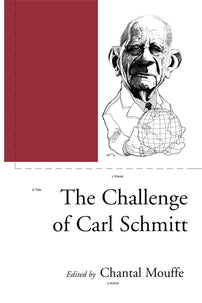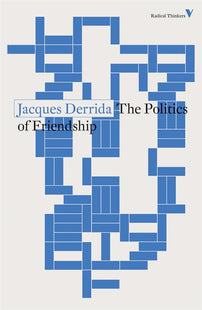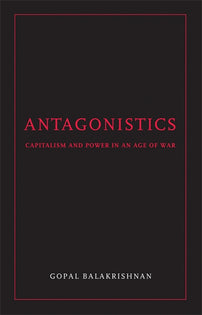States of Emergency, Metaphors of Virus, and COVID-19
With the COVID-19 pandemic increasing in severity by the day, governments across the world have invoked viral metaphors to effect emergency legislation, in the process clamping down on civil liberties. In such a circumstance, what can the work of those who have studied liberal regimes' propensity to make the state of exception the rule, such as Giorgio Agamben and Carl Schmitt, offer to us – if anything at all?

On 26 February, Giorgio Agamben wrote a short piece for the Italian journal Quodlibet, titled ‘L’invenzione di un’epidemia.’[i] There, Agamben claims that coronavirus (recently renamed “SARS-CoV-2” and its disease “COVID-19”) is an epidemic conjured up by the Italian authorities and exacerbated by the national media. For him, the virus functions as an insidious form of mass panic and misdirection, as an excuse to extend prohibitive emergency measures over a mostly willing and anodyne population.
For anyone vaguely acquainted with Agamben’s work, his response won’t come as much of a surprise. His view is that citizens accept the bare minimum of existence to live under almost permanent restrictions of liberty. Governments treat every event as a pretext for the suspension of normal laws. Citizens adapt to the new reality: they defer to the exception, and so it becomes the rule. In doing so, some vital element of human life is suppressed or undone.
Agamben’s work has long looked at the nefarious implications of “bare life” and “states of exception.”[ii] So it should surprise no one to see him reiterate these themes amid an extraordinary collective human crisis, especially one which he believes has been engineered to the effect of both bolstering our experience of life as one of mere biological survival, and of thwarting our ability to experience life as living, that is, to move freely in the world.
So, here we are, galled by an elderly and misguided sage, a man born in 1942 whose stringent theoretical dispositions have clouded his judgement. On this small amount of evidence, Agamben is a coronavirus truther. His reliance on philosophical abstractions, just as the material world deteriorates around him, is his intellectual ruin. That he is personally more at risk from his wrongheaded assumptions adds an extra level of pathos and concern.
The following day, Jean-Luc Nancy wrote a rebuttal in another Italian journal, Antinomie.[iii] Not only does Nancy state the obvious medical knowns about COVID-19 to contradict Agamben’s analysis, he also draws on damning personal experience. About thirty years ago, Agamben had been one of the few people to advise Nancy to avoid having a heart transplant. Nancy politely reminds us (and him) that if he had acted on this advice he would almost certainly be dead, which counts as something less, presumably, than mere biological survival.
On 17 March, Agamben attempts to clarify his position.[iv] He claims journalistic manipulation. He remains disturbed by the probable long-term residue from the new draconian powers implemented at federal and municipal levels. He predicts the unstoppable movement of social life online. He also makes a curious value judgement. The fear of death, now closely allied to touching and proximity, “is not something that brings men and women together, but something that blinds and separates them.”
Most of us are now aware of the gravity and horror of the current calamity, more so in Italy than here in the UK. Many of us recognise that by social distancing and self-isolating we’re committing to acts of compassion, however futile. This is more acute for the young and healthy, as our withdrawal from physical intimacy is a fundamentally altruistic gesture, helping to prevent the spread of infection to those more at risk. This self-assurance seems quaint and belated but, crucially, good enough.
To think that states of emergency have become the permanent condition of political life obscures a thorough scrutiny of the present moment in all its contradictions. But Agamben’s near-sightedness, if nothing else, does encourage vigilance. The second reading of the UK Government’s ‘Coronavirus Bill 2019-21’ took place just a week after Agamben’s initial intervention.[v] The bill not only increases police powers of detention and isolation, it also removes certain safeguards on state surveillance and relaxes protections on forced detention and treatment, which disproportionately affect vulnerable and marginalised people. These measures will be in place for at least two years.
*
In times of crisis, the function of language takes on a new salience. Yet, even in peril we bristle at the words of our leaders. On 12 March, the UK Prime Minister Boris Johnson warned “families” that they “will lose loved ones.”[vi] Those who will actually die aren’t afforded the courtesy of direct address. When we’re unequivocally spoken to it comes in waves of hallucinogenic communication. On 18 March, Johnson signs off on a press release containing several visual assaults, among them: “Yes this enemy can be deadly, but it is also BEATABLE.”[vii]
Where do we look, then, for leadership and guidance? Expert opinion gains in importance. Never before have I attached so much authority to the words of a virologist or an epidemiologist. That those same experts may disagree, or that they emphasise different things, is seemingly a testament to their scrupulousness and rationality. It is this deference to these unassuming overlords that Agamben, in fairness, cautions against. Yet as our political and administrative leaders invoke the language of emergency and of enemy, the apparition of Carl Schmitt, Agamben’s great influence, ghosts into view.
Perhaps it is because in sick times we demand a diagnostician, or at least one who looks like one. Schmitt, Weimar critic of liberalism and subsequent Nazi jurist, has already become the go-to intellectual authority for our uncertain, divisive, byzantine age. His insights into the nature of sovereignty, state conflict, and legal order supposedly envisage the general geopolitical landscape, one populated by authoritarian demagogues, ‘us and them’ domestic policies, and arcane global institutions. Schmitt, after all, spent the 1920s warning of indecisive parliaments and leaky constitutions before offering his judicial expertise to the Third Reich, writing articles like “The Führer Protects the Law.” Who better then to characterise and cure the political ills of the present than a figure so deeply complicit in the horrors of the past? History neither rhymes nor repeats itself; during an extraordinary pandemic, it offers a derisory echo.
William E. Scheuerman prefaces his 2019 edition of his book on Schmitt The End of Law, with an admission of failure.[viii] His original intervention twenty years ago was to forestall Schmitt’s recovery. Now, Schmitt is “a household name in the English-speaking academic world”, whose disciples range from right-wing populists to China’s policymakers. Clear authority and quick decision-making is seen as an international priority, not least when tackling COVID-19.
According to Scheuerman, Schmitt’s legal beliefs founded his political choices. His criticisms of the rule of law led him to formulate and endorse “a National Socialist alternative to liberal jurisprudence.” This alone should give us pause. However suggestive Schmitt’s analysis, his solutions were disastrous. Scheuerman’s main problem, as it is for so many Schmitt scholars, is in balancing fair criticism with just admonishment, in giving due consideration to a thinker he understandably abhors.
For Schmitt, indeterminacy—the view that legal questions lack single right answers—was the key theoretical dispute within law, and his thoughts on this influenced a generation of big-name social scientists and economists. From this, Scheuerman’s book highlights Schmitt’s compelling idea that we live under permanent states of emergency, as governments indefinitely extend their powers to counter perceived existential threats.
[book-strip index="1" style="display"]Scheuerman argues that Schmitt saw this executive tendency coming. His legal scepticism and “dire portrayal of the political universe” led him to the understanding that emergencies were unavoidable, irrepressible and ubiquitous. Emergency powers are transformed in the globalised world as a function of authoritarianism and economic exploitation. They are secretive and unaccountable. Clear resistance is difficult. The book offers a seductive example: one worker in Kentucky, learning that a multinational corporation has acquired his coalmine, asks only: “Who do we shoot now?” Authentic crises, such as the one wrought by COVID-19, cleave through the fog. They necessarily reveal figures of accountability; we must know who is to blame if things go wrong.
Schmitt elsewhere offers broad prophecy and portent. Consisting of terse axioms and slippery phrasing, his writing becomes easy shorthand for explaining modern politics. His superficial dictums haunt the present. Recalling Schmitt’s political distinction, “between friend and enemy,” populist leaders employ cronyism and identity politics to shape public policy. For demagogues such as Donald Trump, COVID-19 is primarily a hoax orchestrated by domestic opponents. Brazilian president Jair Bolsonaro, outwardly dubious of the virus’s severity, has contracted himself the COVID-19. On 22 March, news reports reveal that Iran’s Ayatollah Ali Khamenei believed that the US manufactured the pandemic.[ix] Amid catastrophe, one must still define one’s enemy.
Scheuerman doesn’t wish to indulge Schmitt’s resurgence as a radical seer, all the while spending about 350 pages unpacking his tightly compressed and ambiguous body of work. Schmitt’s vaunted prescience seems less rooted in his metaphorical power, in his clinical diagnosis and malignant treatments, more a product of our cravings for palmistry and prediction. The relative inability to test for COVID-19 shows the inadequacy of clarifying the present. In tumult, we gaze back to anticipate.
*
Often in hope and denial, we rely on timeworn assumptions that edge us closer to conspiracy and misdiagnosis. This is partly what catches out Agamben and explains Schmitt’s intellectual revival. The desire to diagnose a crisis during its moment of rupture is a foolhardy enterprise. We may instead invoke Hegel’s reading of the owl of Minerva: that we only understand history as it fades from view. We may just as well state: before making judgement, let’s take a moment to reflect.
If this is the case, how do we comprehend the crisis in the meantime? Viruses provide ostensibly apt metaphors for social watersheds. On 19 March, with reference to Susan Sontag’s essay “Illness as Metaphor,” Paul Elie writes that in the digital and globalised age,
[…] we’ve applied illness metaphors to society, stripping them of their malign associations in the process. It may be that our fondness for virus as metaphor has made it difficult for us to see viruses as potentially dangerous, even lethal, biological phenomena. In turn, our disinclination to see viruses as literal may have kept us from insisting on and observing the standards and practices that would prevent their spread. Enthralled with virus as metaphor and the terms associated with it—spread, growth, reach, connectedness—we ceased to be vigilant. Jetting around the world, we stopped washing our hands.[x]
I dispute the implied causation but accept the overall point. Without reaching for metaphor, perhaps we indulge etymology instead. Corona comes from the Latin for crown, a metonym for monarchy. The worry is that despite our efforts and the efforts of our political leaders, it will be the virus, inevitably, that reveals itself as sovereign.
In a viral video posted on 14 March, Dr Michael Ryan, executive director of the World Health Organization (WHO), warned of the sluggish international response to COVID-19: “Perfection is the enemy of the good when it comes to emergency management. […] The greatest error is to be paralysed by the fear of failure.”[xi] The most important thing then is to act quickly, recalling Schmitt’s maxim that the ability to decide on the exception is that which reveals the sovereign. That liberal, democratic, pluralist institutions valorise decision is an irony that wouldn’t be lost on Schmitt.
Yet, it is the language of enemy that so far has trumped the metaphor of virus to describe COVID-19. On March 19, the WHO director-general Tedros Adhanom Ghebreyesus calls it an “enemy of humanity.”[xii] The universalism in this would make Schmitt anxious – invocations of humanity obscure the friend-enemy distinction. Speaking of universalism in politics is dangerous because it is ill defined and dishonest: “The adversary is thus no longer called an enemy but a disturber of peace and is thereby designated to be an outlaw of humanity.”[xiii] Common moral principles risk turning international relations and domestic politics into conflicts between the human and the inhuman, rather than between legitimate competing actors. Even now, Trump, Bolsonaro and Khamenei are identifying their enemies.
The problem with COVID-19 is that while the contagion fails to discriminate, the fatality rate is specific. As the number infected increases, for those at risk, the death toll will rise. I’ve noted dates of publication and pronouncement because this evolving disaster will make fools of all of us. Much of this article will look hopelessly naive in the next weeks and months because it is immediately inscribed into the recent past. To watch a widely-shared news report in the evening, one depicting the delicate mortal balance in a Bergamo hospital, is to render senseless the thoughts of the morning.
Joseph Owen is writing a doctoral thesis on Carl Schmitt and literary modernism at University of Southampton. He moonlights as a critic at European film festivals
[book-strip index="2" style="display"][i] https://www.quodlibet.it/giorgio-agamben-l-invenzione-di-un-epidemia
[ii] Giorgio Agamben, Homo Sacer: Sovereign Power and Bare Life, trans. by Daniel Heller-Roazen (Palo Alto, CA: Stanford University Press, 1998); State of Exception, trans. by Kevin Attell (Chicago, IL: University of Chicago Press, 2008).
[iii] https://antinomie.it/index.php/2020/02/27/eccezione-virale/
[iv] https://itself.blog/2020/03/17/giorgio-agamben-clarifications/
[v] https://services.parliament.uk/bills/2019-21/coronavirus.html
[vi] https://www.youtube.com/watch?v=PA-MsoqRY5k
[vii] https://twitter.com/BorisJohnson/status/1240307154671874050
[viii] William E. Scheuerman, The End of Law: Carl Schmitt in the Twenty-First Century, 2nd edn (Lanham, MD: Rowman & Littlefield, 2019).
[ix] https://uk.reuters.com/article/uk-health-coronavirus-iran/khamenei-says-u-s-offer-to-help-iran-fight-coronavirus-is-strange-idUKKBN2190A2
[x] https://www.newyorker.com/news/daily-comment/against-the-coronavirus-as-metaphor
[xi] https://www.news.com.au/technology/online/social/coronavirus-who-says-governments-need-to-react-to-virus-quickly-not-perfectly/news-story/f3cdc60941df854a5d3d1321486ba3ef
[xii] https://www.channelnewsasia.com/news/world/coronavirus-covid-19-who-enemy-against-humanity-1255425
[xiii] Carl Schmitt, The Concept of the Political, trans. by George Schwab (Chicago, IL: University of Chicago Press, 2007).





